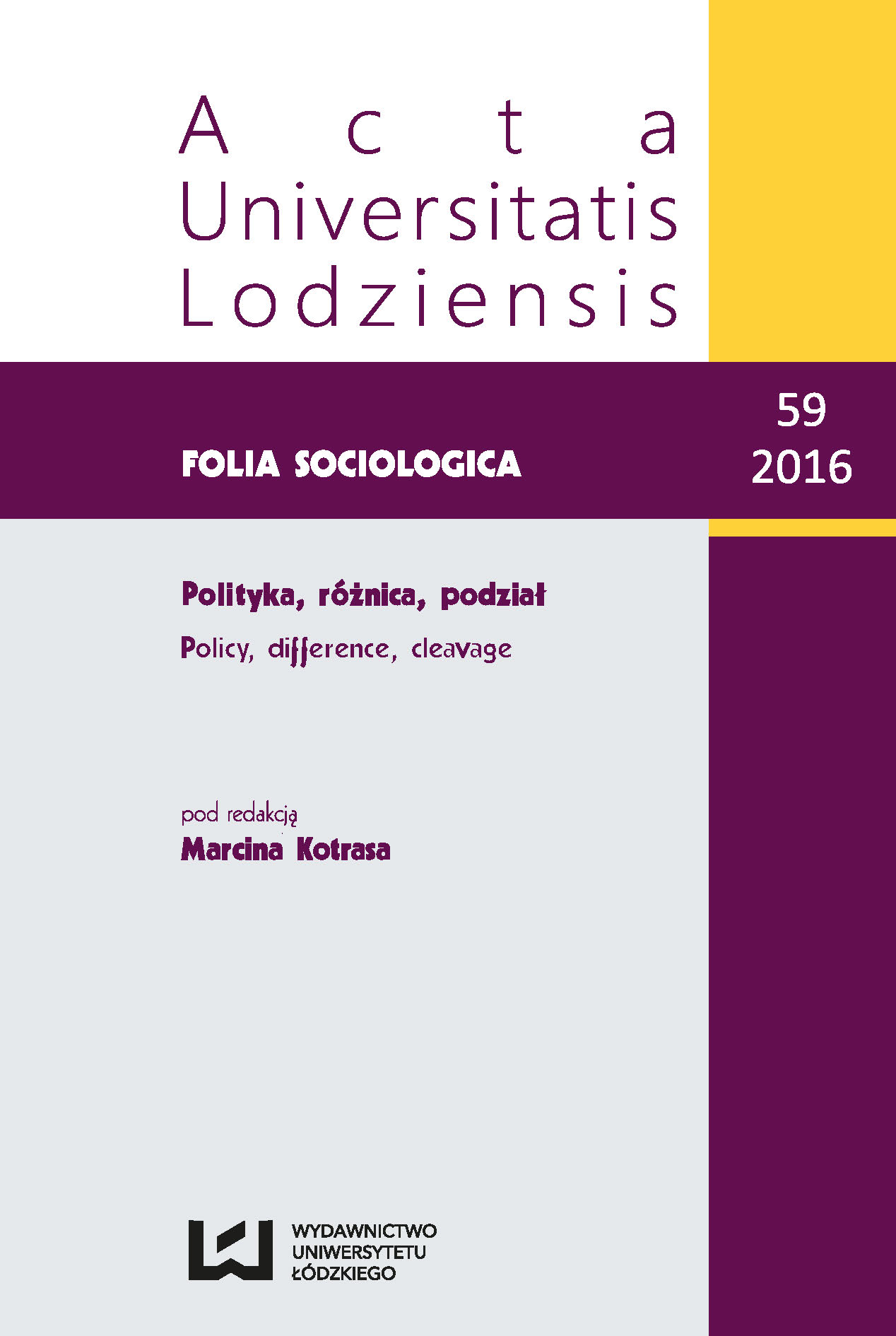Disabled citizens – defining their own role in the political process. An empirical analysis of the attitudes of disabled people in Poland in 2002–2014
DOI:
https://doi.org/10.18778/0208-600X.59.03Keywords:
disability, political subjectivity, citizenship, European Social SurveyAbstract
Define our own role in the process of political participation determines the manner of its implementation, and therefore the attitude we adopt the operating entity in the wider political community. This may be the attitude of an active actor co-responsible for the direction and quality of the policy, or lacking a sense of agency. In the case of disabled persons adopt the first of them it is difficult due to both objective barriers associated with perceptual-motor constraints, and because of the subjective, deeply rooted in society and among the disabled themselves, stereotyping ways of thinking about the functioning of this social category in society. Going beyond this scheme requires the realization of the social model of disability, in which persons with disabilities are active participants in social life, contributing to its development.
The aim of the article is to present the dynamics of change in the perception of people with disabilities in Poland, their subjectivity in the political dimension. The analysis will cover issues such as: interest in politics, trust in political institutions and the generalized others, their capacity to co-create the policy. The data used in the empirical analysis is derived from European Social Survey (2002–2014).
References
Barnes C. (2012), Understanding the social model of disability: past, present and future, [in:] N. Watson , A. Roulstone, C. Thomas (eds.), Routledge Handbook of Disability Studies, Routledge, London‒New York, pp. 12–29.
Google Scholar
Bogacz-Wojtanowska E. (2014), Partycypacja polityczna i społeczna. Niepełnosprawni obywatele w Polsce, [in:] B. Gąciarz, S. Rudnicki (eds.), Polscy niepełnosprawni. Od kompleksowej diagnozy do nowego modelu polityki społecznej, Wydawnictwa AGH, Kraków, pp. 235–274.
Google Scholar
Conrad P. (1992), Medicalization and social control, “Annual Review of Sociology”, Vol. 18, pp. 209–232.
Google Scholar
Dziubka K. (1998), Społeczeństwo obywatelskie: wybrane aspekty ewolucji pojęcia, [in:] A.W. Jabłoński, L. Sobkowiak (eds.), Studia z teorii polityki, Wydawnictwo Uniwersytetu Wrocławskiego, Wrocław, Vol. 2, pp. 31–52.
Google Scholar
ESS Round 1–7: European Social Survey Round 1–7 Data (2002–2014), Norwegian Social Science Data Services, Norway – Data Archive and distributor of ESS data for ESS ERIC.
Google Scholar
Finkelstein V. (1980), Attitudes and disabled people, World Rehabilitation Fund, New York.
Google Scholar
Gąciarz B., Bartkowski J. (2014), Położenie społeczno-ekonomiczne niepełnosprawnych w Polsce na tle sytuacji osób niepełnosprawnych w krajach Unii Europejskiej, „Niepełnosprawność. Zagadnienia, Problemy, Rozwiązania”, No. 2 (11), pp. 20–43.
Google Scholar
Hall J. A. (2000), Reflections on the Making of Civility in Society, [in:] F. Trentmann (ed.), Paradoxes of Civil Society: New Perspectives on Modern German and British History, Berghahn Books, New York, pp. 47–57.
Google Scholar
Keane J. (1988), Democracy and Civil Society, Verso Books, London.
Google Scholar
Konwencja o prawach osób niepełnosprawnych sporządzona w Nowym Jorku dnia 13 grudnia 2006 r., Dz. U. 012, No. 0, item 1169.
Google Scholar
Convention on the Rights of Persons with Disabilities (2006), United Nations, available at: http://www.un.org/disabilities/documents/convention/convoptprot-e.pdf (21.07.2016).
Google Scholar
Marshall Th. H. (1950), Citizenship and Social Class and Other Essays, Cambridge University Press, Cambridge.
Google Scholar
Oliver M. (1981), A New Model of the Social Work Role in Relation to Disability, [in:] J. Campling (ed.), The Handicapped Person: A New Perspective for Social Workers?, RADAR, London, pp. 19–32.
Google Scholar
Oliver M. (1990), The Politics of Disablement, Macmillan, London.
Google Scholar
DOI: https://doi.org/10.1007/978-1-349-20895-1
Oliver M. (2009), Understanding Disability. From Theory to Practice. Second Edition, Palgrave Macmillan, Basingstoke, Hampshire.
Google Scholar
Oliver M., Barnes C. (2012), The New Politics of Disablement, Palgrave Macmillan, New York.
Google Scholar
DOI: https://doi.org/10.1007/978-0-230-39244-1
Perez-Diaz V. M. (1996), Powrót społeczeństwa obywatelskiego w Hiszpanii, Wydawnictwo Znak, Kraków.
Google Scholar
Raciborski J. (2011), Obywatelstwo w perspektywie socjologicznej, Wydawnictwo Naukowe PWN, Warszawa.
Google Scholar
Schwartz Sh. H. (2014), A Proposal for Measuring Value Orientations across Nations: http://www.europeansocialsurvey.org/docs/methodology/core_ess_questionnaire/ESS_core_questionnaire_human_values.pdf (4.04.2016).
Google Scholar
Shakespeare T. (2010), The social model of disability, [in:] L. J. Davis (ed.), The Disability Studies Reader, Routledge, New York‒London, pp. 263−277.
Google Scholar
Shearer A. (1981), Disability: Who’s Handicap? Understanding everyday experience, Basil Blackwell, Oxford.
Google Scholar
Shils E. (1992), Civility and Civil Society, [in:] E. C. Banfield (ed.), Civility and Citizenship in Liberal Democratic Societies, New York: Paragon House, pp. 1–16.
Google Scholar
Siegler M., Osmond H. (1974), Models of Madness: Models of Medicine, Macmillan, New York.
Google Scholar
Skarżyńska K. (1999), Aktywność i bierność polityczna, [in:] K. Skarżyńska (ed.), Psychologia polityczna, Wydawnictwo Zysk i S-ka, Poznań.
Google Scholar
Sztompka P. (2007), Zaufanie. Fundament społeczeństwa, Wydawnictwo Znak, Kraków.
Google Scholar
Theiss-Morse E. (1993), Conceptualizations of Good Citizenship and Political Participation, “Political Behavior”, Vol. 15, No. 4, pp. 355–380.
Google Scholar
Torney-Purta J., Lehmann R., Oswald H., Schultz W. (2001), Citizenship and Education in Twenty-eight Countries. Civic Knowledge and Engagement at Age Fourteen, The International Association for the Evaluations of Educational Achievement, Amsterdam: http://www.iea.nl/fileadmin/user_upload/Publications/Electronic_versions/CIVED_Phase2_Age_Fourteen.pdf (16.07.2016).
Google Scholar
UPIAS – Union of the Physically Impaired Against Segregation (1975), The Fundamental Principles of Disability, http://www.leeds.ac.uk/disability-studies/archiveuk/UPIAS/fundamental%20principles.pdf (21.07.2016).
Google Scholar
Zola I. K. (1983), Socio-Medical Inquiries: Recollections, Reflections, and Reconsiderations, Temple University Press, Philadelphia.
Google Scholar
Downloads
Published
How to Cite
Issue
Section
License

This work is licensed under a Creative Commons Attribution-NonCommercial-NoDerivatives 4.0 International License.










